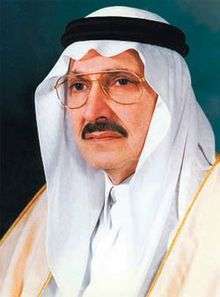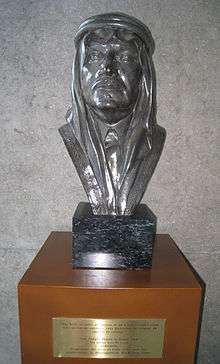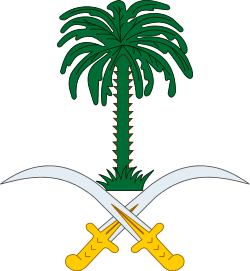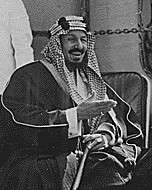Talal bin Abdulaziz Al Saud
| Talal bin Abdulaziz Al Saud | |
|---|---|
 | |
| Born |
1931 (age 84–85) Ta’if, Kingdom of Nejd and Hejaz |
| Spouse(s) |
|
| Parents |
|
| Relatives | Riad Al Solh (father in law) |
| House | House of Saud |
| Religion | Islam |
| Minister of Communications | |
|
In office 1952 – April 1955 | |
| Monarch | |
| Preceded by | Office established |
| Succeeded by | Office merged with Ministry of Finance |
Talal bin Abdulaziz Al Saud (Arabic: طلال بن عبد العزيز آل سعود ), formerly also called The Red Prince,[1] (born 1931) is a senior member of the Saudi royal family. He is notable for his liberal stance, encouraging for a national Constitution and the full rule of law and equality in front of law. He was also the leader of Free Princes Movement.
Early life
Prince Talal was born in 1931. He is the twentieth son of King Abdulaziz.[2][3] His mother was an Armenian woman, Munaiyir, whose family escaped from the Armenian Genocide experienced under the reign of the Ottoman Empire.[4] Munaiyir was presented by the emir of Unayza to Ibn Saud in 1921 when she was 12 years old and Ibn Saud was 45.[4] Their first child was born when she was 15 years old, a son named Talal. Following tradition, Munaiyir became known as Umm Talal, "mother of Talal". However, in 1927, the three-year-old Talal died. In 1931, Talal was born and named in honor of his late brother, following the Bedouin tradition. It is unknown when Abdulaziz divorced his fourth wife and formally wed Munaiyir. She is reported by her family to have remained illiterate all her life and convert to Islam.[4] Munaiyir was regarded by British diplomats in Saudi Arabia as one of King Abdulaziz’s favourite wives. She was as known for her intelligence as for her beauty.[5] She died in December 1991.[6]
Prince Talal was the full brother of Prince Nawwaf. During the reign of their half brother King Saud, they became bitter enemies, to the point of contesting their inheritances.[7]
Positions held
Minister of Communications
Prince Talal became one of the wealthiest young princes but his bureau suffered major corruption problems.[8] Prince Talal was made minister of communications when the office was established in 1952.[9] Then, King Abdulaziz created the ministry of air force to prevent all flight-related matters from his administration.[8] Because Prince Talal and Prince Mishaal contended over who controlled the national airlines, Saudi Arabia was to have two separate fleets.[8] The dispute ended when Prince Talal resigned in April 1955.[8] Later, the ministry of communication was merged with the ministry of finance after Prince Talal's resignation.[8] This allowed King Saud to skip choosing Talal's successor, which would have caused friction in the royal family no matter who King Saud choose.[8]
Minister of Finance and National Economy
King Saud appointed Prince Talal as minister of finance and national economy in 1960.[10] His tenure lasted until his initiation of the Free Princes Movement.[11] The other reason for the removal of Prince Talal is that he proposed in September 1961 to establish a constitution in Saudi Arabia. However, King Saud had no intention or plan to reform the political system. Therefore, he forced Prince Talal to resign from the cabinet.[12] His brother Prince Nawwaf succeeded him in the post.[10]
Controversy
Free Princes Movement
After Prince Talal's palaces were searched by the National Guard while he was abroad, he held a press conference in Beirut on 15 August 1962. His statements caused a stir since he openly criticized and attacked the Saudi regime. As a consequence, his passport was withdrawn, his property confiscated, and some of his supporters in Saudi Arabia arrested. Soon the North Yemen Civil War began, and one week later, four crews of Saudi Arabian Airlines defected to Egypt. Prince Talal adopted the name of the 'Free Princes' in Cairo on 19 August 1962, and broadcast his progressive views on the Radio Cairo. Later, he and two of his brothers, Prince Fawwaz and Prince Badr,[13] and one of his cousins, Prince Saad, began to make statements on behalf of the Saudi Liberation Front.After four years, during which Faisal offered tremendous financial inducements to the Free Princes, the latter were again reconciled with the royal family.[12]
His return to Saudi Arabia and rehabilitation was made possible through the mediation of his mother, Munaiyir. In exile, his own family did not support him and even criticized him for his intensive sympathy with then Egyptian President Gamal Abdel Nasser, Saudi Arabia’s foremost enemy. On 8 September 1963, The Sunday Telegraph reported that Talal’s mother, Munaiyir, advised her son that he was behaving foolishly while his younger sister Madawi kept asking him to return home. A few days later, Prince Talal returned to Saudi Arabia. King Faisal was reported not to forgive Prince Talal but privately assured his mother that his assets would be unfrozen and that he could safely return home.[5]
Views
After the September 11 attacks, Prince Talal challenged the "potentially very confusing" claim that rulers and religious scholars should jointly decide affairs of state.[14] He openly stated his support for the establishment of an elected assembly in Saudi Arabia in 2001.[15] In September 2007, he announced his desire to form a political party to advance his goal of liberalizing the country.[16]
In 2009, Prince Talal stated, "King Abdullah is the ruler. If he wills it, it will be done."[17] However, in March 2009, he called on King Abdullah to clarify the appointment of Prince Nayef as second deputy prime minister.[18] He publicly questioned whether it would make Prince Nayef the next crown prince.[18] Prince Nayef was in fact named crown prince in October 2011 following the death of his brother, Prince Sultan. Prince Talal was a member of the Allegiance Council when the members were named in 2007. He resigned from the Council in November 2011, apparently in protest of late Prince Nayef's appointment as Crown Prince. In April 2012, he said that the "hand of justice" should reach all the corrupt in Saudi Arabia, and called on the National Anti-Corruption Authority (NACA) to reach everyone, regardless of status.[19] In his June 2012 Al Quds Al Arabi interview, Prince Talal stated that the princes on the Allegiance Council were not consulted on the succession of Prince Salman and that the Council became ineffective.[20] He also called for establishing a constitutional monarchy in Saudi Arabia.[20]
Various positions

Prince Talal is the chairman of Arab Gulf Program For The United Nations Development (AGFUND), which promotes socioeconomic development in the Middle East.[21][22] As part of AGFUND, he has led the board of trustees of the Arab Network for NGOs based in Cairo[23] and established Arab Open University.[22] He has also supported training of women through AGFUND.[24] Through AGFUND, he provided significant monetary support for UNICEF and UNICEF declared him as its Special Envoy in 1980.[25] He became UNESCO's Special Envoy for Water in 2002 to encourage the development of safe water.[26]
He is the president of the Arab Council for Childhood and Development.[27] He also helped create the Mentor Foundation and is honorary member on its board of trustees.[28] He co-founded the Independent Commission for International Humanitarian Issues.[28] He is also a prominent member of the League for Development of the Pasteur Institute[28] and the honorary president of Saudi Society of Family and Community Medicine.[29]
Philanthropy
Talal has provided Saudi students foreign education scholarships. He founded Saudi Arabia's first school for vocational training in 1954 and the first girls' school based in Riyadh in 1957. He donated his own birthplace palace—Al-Zahra Palace in Taif—for a school in 1957. His private hospital in Riyadh, established in 1956, gives 70% of its profits for free health care and 10% to children's health care. He then later donated the hospital to the government and is presently called King Abdulaziz University Hospital.
Personal life
Prince Talal is known to have wed four times. He first married Umm Faisal, who is the mother of Faisal. He later divorced her.
He later got married the Princess Mona Al-Solh, the daughter of Riad Al Solh, the first prime minister of Lebanon.[1][30] Their children are Prince Al-Waleed bin Talal,[30] Prince Khaled bin Talal and Princess Reema.[31] The marriage collapsed in 1962; they remained separated until their divorce in 1968.[31] Prince Talal hired one professor from the University of Houston and an instructor to teach English, psychology and Western civilization to his daughter Reema, who was 18 years old, in Riyadh in 1976.[32]
His third wife was Moudie bint Abdul Mohsen Alangary. She is the mother of Turki and Sara. They later divorced. Lastly, he is married to Magdah bint Turki Al Sudairi, daughter of former Human Rights Commission President Turki bin Khaled Al Sudairi.[33]
Prince Talal has fifteen children, nine sons and six daughters. His sons are Faisal (died 1991), Al Waleed, Khaled, Turki, Abdulaziz, Abdul Rahman, Mansour, Mohammed and Mashour. His daughters are Reema, Sara, Noura, Al Joharah, Hibatallah and Maha. His daughter Sara claimed political asylum in the United Kingdom over fears for her safety in Saudi Arabia on 7 July 2012.[34]
Ancestry
| Ancestors of Talal bin Abdulaziz Al Saud | |||||||||||||||||||||||||||||||||||||||||||||||||||||||||||||||||||||||||||||||||||||||||||||||||||||||||||||||||||||||||||||||||||||||||||||||||||||||||||||||||||||||||||||||||||||||||||||||||||||||||||||||||||||||||||||||||||||||||||||||||||||||||||
|---|---|---|---|---|---|---|---|---|---|---|---|---|---|---|---|---|---|---|---|---|---|---|---|---|---|---|---|---|---|---|---|---|---|---|---|---|---|---|---|---|---|---|---|---|---|---|---|---|---|---|---|---|---|---|---|---|---|---|---|---|---|---|---|---|---|---|---|---|---|---|---|---|---|---|---|---|---|---|---|---|---|---|---|---|---|---|---|---|---|---|---|---|---|---|---|---|---|---|---|---|---|---|---|---|---|---|---|---|---|---|---|---|---|---|---|---|---|---|---|---|---|---|---|---|---|---|---|---|---|---|---|---|---|---|---|---|---|---|---|---|---|---|---|---|---|---|---|---|---|---|---|---|---|---|---|---|---|---|---|---|---|---|---|---|---|---|---|---|---|---|---|---|---|---|---|---|---|---|---|---|---|---|---|---|---|---|---|---|---|---|---|---|---|---|---|---|---|---|---|---|---|---|---|---|---|---|---|---|---|---|---|---|---|---|---|---|---|---|---|---|---|---|---|---|---|---|---|---|---|---|---|---|---|---|---|---|---|---|---|---|---|---|---|---|---|---|---|---|---|---|---|
| |||||||||||||||||||||||||||||||||||||||||||||||||||||||||||||||||||||||||||||||||||||||||||||||||||||||||||||||||||||||||||||||||||||||||||||||||||||||||||||||||||||||||||||||||||||||||||||||||||||||||||||||||||||||||||||||||||||||||||||||||||||||||||
References
- 1 2 Vijay Prashad (2007). The Darker Nations- A Biography of the Short-Lived Third World. LeftWord Books. p. 275. ISBN 978-81-87496-66-3. Retrieved 13 September 2013.
- ↑ Taheri, Amir (2012). "Saudi Arabia: Change Begins within the Family". The Journal of the National Committee on American Foreign Policy. 34 (3): 138–143. doi:10.1080/10803920.2012.686725.
- ↑ Gornail, Jonathan (8 March 2013). "Newsmaker: Prince Al Waleed bin Talal bin Abdulaziz Al Saud". The National. Retrieved 18 July 2013.
- 1 2 3 Rossant, John (19 March 2002). "The return of Saudi Arabia's red prince". Online Asia Times. Retrieved 4 May 2012.
- 1 2 Stenslie, Stig (2011). "Power Behind the Veil: Princesses of House of Saud". Journal of Arabian Studies: Arabia, the Gulf, and the Red Sea. 1 (1): 69–79. doi:10.1080/21534764.2011.576050.
- ↑ Sabri Sharaf (2001). The House of Saud in Commerce: A Study of Royal Entrepreneurship in Saudi Arabia. Sharaf Sabri. p. 126. ISBN 978-81-901254-0-6. Retrieved 2 April 2013.
- ↑ Kechichian, Joseph A. (2001). Succession in Saudi Arabia. New York: Palgrave. p. 28. Retrieved 6 April 2012.
- 1 2 3 4 5 6 S. Hertog (23 February 2011). Princes Brokers and Bureaucrats Z. Cornell University Press. p. 46. ISBN 978-0-8014-5753-1. Retrieved 21 July 2013.
- ↑ "Brief History". Ministry of Communications and Information Technology. Retrieved 31 August 2012.
- 1 2 Yitzhak Oron, Ed. Middle East Record Volume 2, 1961. The Moshe Dayan Center. p. 419. GGKEY:4Q1FXYK79X8. Retrieved 11 April 2013.
- ↑ Qasem, Islam Yasin (16 February 2010). "Neo-rentier theory: The case of Saudi Arabia (1950-2000)" (PDF). Leiden University. Retrieved 13 May 2012.
- 1 2 Nehme, Michel G. (October 1994). "Saudi Arabia 1950-80: Between Nationalism and Religion". Middle Eastern Studies. 30 (4): 930–943. doi:10.1080/00263209408701030. JSTOR 4283682.
- ↑ Henderson, Simon (1994). "After King Fahd" (Policy Paper). Washington Institute. Retrieved 2 February 2013.
- ↑ Bronson, Rachel (2005). "Rethinking Religion: The Legacy of the U.S.-Saudi Relationship" (PDF). The Washington Quarterly. 28 (4): 121–137. doi:10.1162/0163660054798672.
- ↑ Eur (22 November 2002). The Middle East and North Africa 2003. Taylor & Francis. p. 952. ISBN 978-1-85743-132-2. Retrieved 1 September 2012.
- ↑ "Saudi Arabia's Ailing Gerontocracy". David Ottoway. 1 December 2010. Retrieved 21 July 2013.
- ↑ Allam, Abeer (30 September 2010). "The House of Saud: rulers of modern Saudi Arabia". Financial Times. Retrieved 22 July 2013.
- 1 2 Karam, Souhail (28 March 2009). "Saudi prince questions king's deputy appointment". Reuters. Retrieved 1 June 2012.
- ↑ Admon, Y. (4 April 2012). "First Signs of Protest by Sunnis in Saudi Arabia". MEMRI. Retrieved 5 April 2012.
- 1 2 "Saudi Allegiance council ineffective: Saudi prince Talal". Islam Times. 21 June 2012. Retrieved 22 June 2012.
- ↑ "AGFUND contributes in the relief effort for the stranded on the Libyan border". AGFUND. 7 March 2011. Retrieved 1 June 2012.
- 1 2 "Arab Open University". Arab Open University. Retrieved 8 July 2012.
- ↑ "Civil Society Development". AGFUND. Retrieved 8 July 2012.
- ↑ "Prince Talal heads the meetings of the trustees of CAWTAR and the "Five Sisters" committee in Tunisia". AGFUND. 14 December 2009. Retrieved 8 July 2012.
- ↑ "Partnership with AGFUND". UNICEF. Retrieved 8 July 2012.
- ↑ "UNESCO Special Envoy for Water". UNESCO. Retrieved 8 July 2012.
- ↑ "ACCD's President". Arab Council for Childhood and Development. Retrieved 8 July 2012.
- 1 2 3 "HRH Prince Talal Bin Abdulaziz Al Saud". The Mentor Foundation. Retrieved 8 July 2012.
- ↑ "Prince Talal bin Abdulaziz to Patronize Medical Conference". Saudi Press Agency. 3 February 2010. Retrieved 16 March 2013.
- 1 2 Henderson, Simon (27 August 2010). "The Billionaire Prince". Foreign Policy. Retrieved 21 October 2012.
- 1 2 Khan, Riz. Alwaleed: Businessman, Billionaire, Prince. New York: William Morrow, 2005. pp. 17-19. Print.
- ↑ "Arab prince brought college to daughter". The Milwaukee Sentinel. 21 October 1976. Retrieved 11 February 2013.
- ↑ "Profiles". Saudi Gazette. 15 February 2009. Retrieved 29 February 2012.
- ↑ "Saudi Arabia's Princess Sara claims asylum in the UK". The Telegraph. 7 July 2012. Retrieved 7 July 2012.
External links
| Wikiquote has quotations related to: Talal bin Abdul Aziz |
| Wikimedia Commons has media related to Talal bin Abdulaziz Al Saud. |
- Official website, (Arabic) (English)
- Arabou (English)

